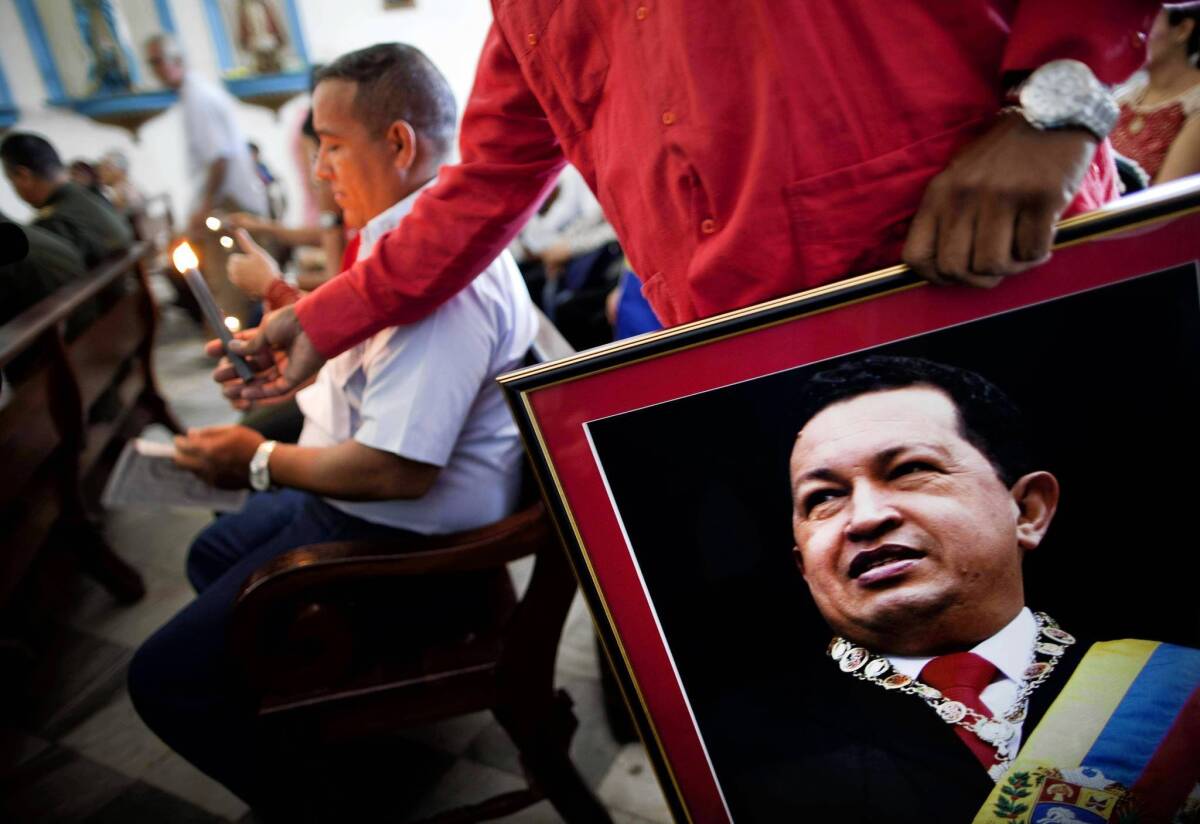In Venezuela, President Hugo Chavez’s absence raises questions

- Share via
CARACAS, Venezuela — A group of constitutional law professors on Tuesday said President Hugo Chavez’s absence from an oath-taking ceremony Thursday without a formal request for postponement for health reasons will make an extension of his mandate unconstitutional and a “usurpation of authority.”
The law professors made their case on the same day that Vice President Nicolas Maduro confirmed widespread expectations that Chavez will not attend the inauguration because he is still recovering from Dec. 11 cancer surgery in Havana.
“The medical team working to reestablish [Chavez’s] health agrees that the postoperative recovery period should extend past Jan. 10, and so he will not be able to appear before the National Assembly on that date,” Maduro said in a statement read Tuesday before the legislative body. The National Assembly subsequently approved an unlimited absence.
Maduro also said Chavez would be sworn in on an unspecified date by the Supreme Court, a move that the vice president said is permitted under Article 231 of the constitution.
But a statement signed by 38 professors from various law schools said Chavez must either take the oath or demonstrate that he is still capable of governing by formally asking for a temporary delay. If Chavez is permanently incapacitated, the president of the National Assembly must assume power temporarily and call a new presidential election.
“A different solution goes against the constitution, extends a presidential period that has already lapsed and moreover generates unnecessary uncertainty that affects constitutional security and stability,” said Enrique Sanchez Falcon, a constitutional law expert at Central University of Venezuela.
The professors were addressing the constitutional crisis enveloping Venezuela with the approach of the end of Chavez’s third term Thursday and scheduled start of his fourth. They said an approved absence for heath reasons does not mean the oath-taking can be deferred as well, which is the argument that Chavistas are making.
Chavez has not been seen or heard from in nearly a month. The issue at the root of the wrangling is whether he is truly on the road to recovery and in possession of his mental capacities, as his supporters say, or at death’s door and incapable of governing.
In an interview, Sanchez Falcon said that a request by Chavez for a swearing-in delay would give Venezuelans an opportunity to verify that he is in “full possession of his mental faculties.”
First diagnosed with cancer in June 2011, Chavez won reelection in October by a significant margin over opponent Henrique Capriles. But since he announced Dec. 8 that he would return to Cuba for his fourth surgery, speculation has swirled that his cancer is terminal. The lack of detailed medical reports has heightened the uncertainty.
“Precise and transparent information on the president’s physical condition does not exist,” said political scientist Luis Lander of the Central University of Venezuela.
Officials in Chavez’s government, including Atty. Gen. Cilia Flores, have described the Jan. 10 ceremony before the National Assembly as a mere formality that Chavez can miss and still assume a fourth term.
Nicolas Picado, a former official in Chavez’s Foreign Ministry and now a consultant, said that the “popular legitimacy” of Chavez’s government is a more important factor than the constitution.
“Formalities can’t compete with the quasi-religious, magical power that Chavez demonstrated in his Oct. 7 victory,” Picado said in an interview.
The law professors’ statement followed a release by Venezuela’s Roman Catholic bishops that described efforts by Chavez’s supporters to “manipulate the constitution to favor one political group” as “morally unacceptable.”
Also on Tuesday, the Brazilian government said it believed the inauguration could be deferred. The faculty union of Venezuela’s largest university denounced the statement as an interference in the nation’s domestic affairs.
Victor Marquez, faculty association president at the Central University of Venezuela, said the assumption of power by Chavez’s ministers without adhering to constitutional norms would represent a “coup against the Magna Carta.”
Kraul and Mogollon are special correspondents.
More to Read
Sign up for Essential California
The most important California stories and recommendations in your inbox every morning.
You may occasionally receive promotional content from the Los Angeles Times.












